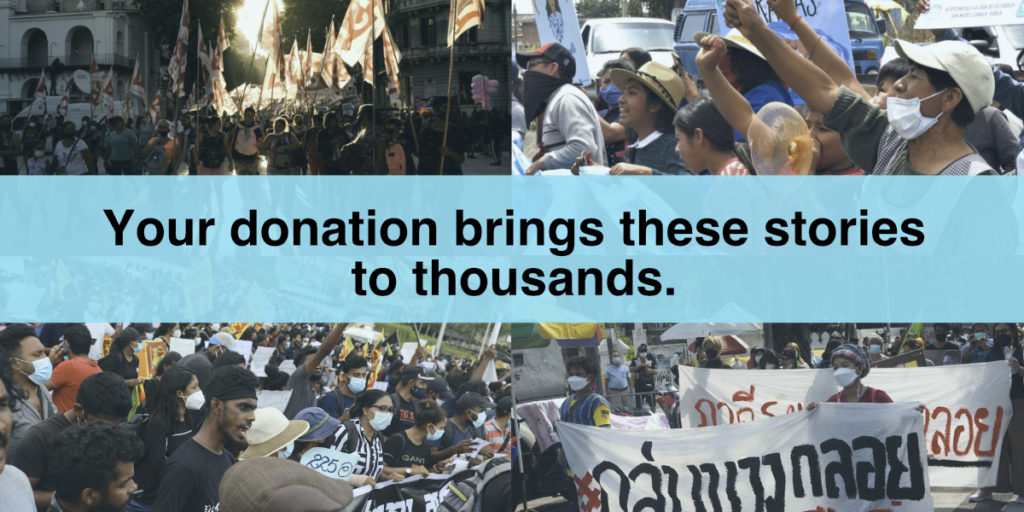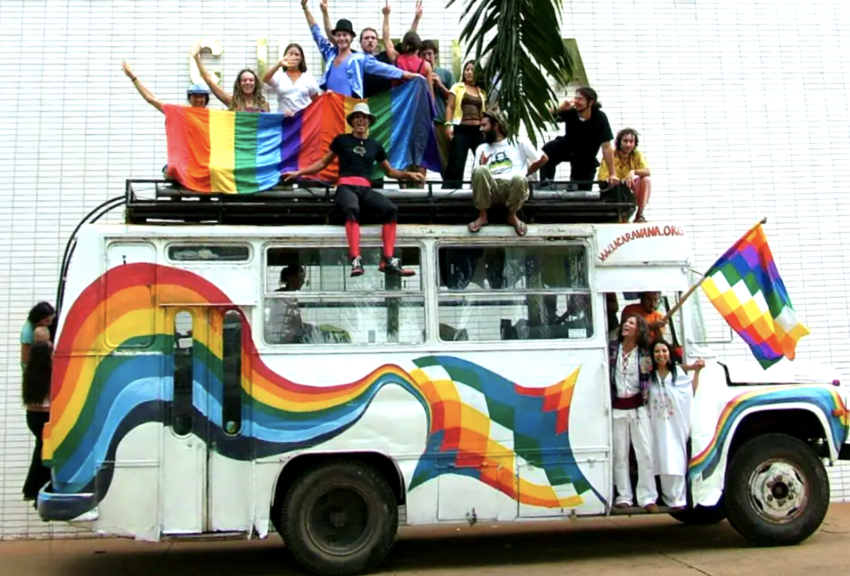Editor’s Note From Rivera Sun
Happy Solstice! This is the longest night of the year (in the northern hemisphere – it’s the opposite for our readers on the other side of the world). Since the darkness falls around 4:30pm where I am, here’s a special edition of Nonviolence News filled with 32 bright ideas to light up your hearts. These are collected from the thousands of stories we’ve shared in 2022. It’s the perfect way to kick off our end-of-the-year Special Reports, which include hundreds of success stories in struggles for the Earth, workers, racial justice, and much more. These will be released over the next few weeks, so check your inbox!
What are these bright ideas? Bike libraries. Teen ‘courts’ rooted in restorative justice. Community peacebuilders. Eco-barrios in Latin America. These programs and projects infuse nonviolent solutions into the structure of our societies. Some are just getting started. Others are celebrating a decade – or more – of achievements. A few are implementing a tried-and-true design from somewhere else. All deserve our notice – and our replication. These are ideas that, if applied to all of our cities and towns, could transform our world.
To use language from the field of nonviolence, they are “alternative institutions” that provide a different approach than the harmful, violent, or destructive systems they are replacing. Mohandas K. Gandhi called these “constructive programs” and went a step further in connecting them to nonviolent strategy. In his view, a constructive program built the strength, dignity, and capacity of the movement while lessening their reliance on the oppressor or unjust systems. As you read these stories, imagine what our society would be like if thousands of towns and cities implemented them. We would live in a profoundly changed culture. It’s a world I’d like to live in. How about you?
In vision,
Rivera Sun
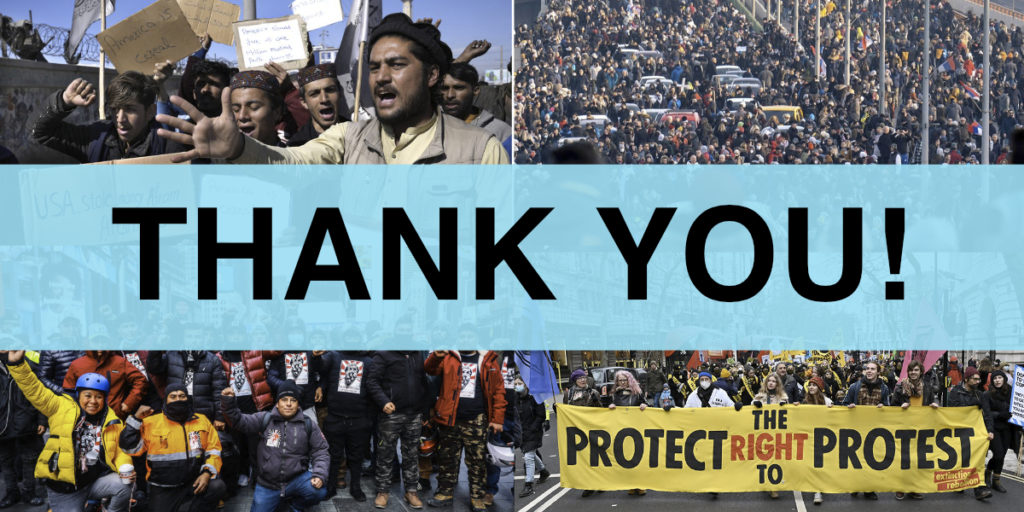
Generous readers, thank you. You make Nonviolence News possible.
Donate here>>
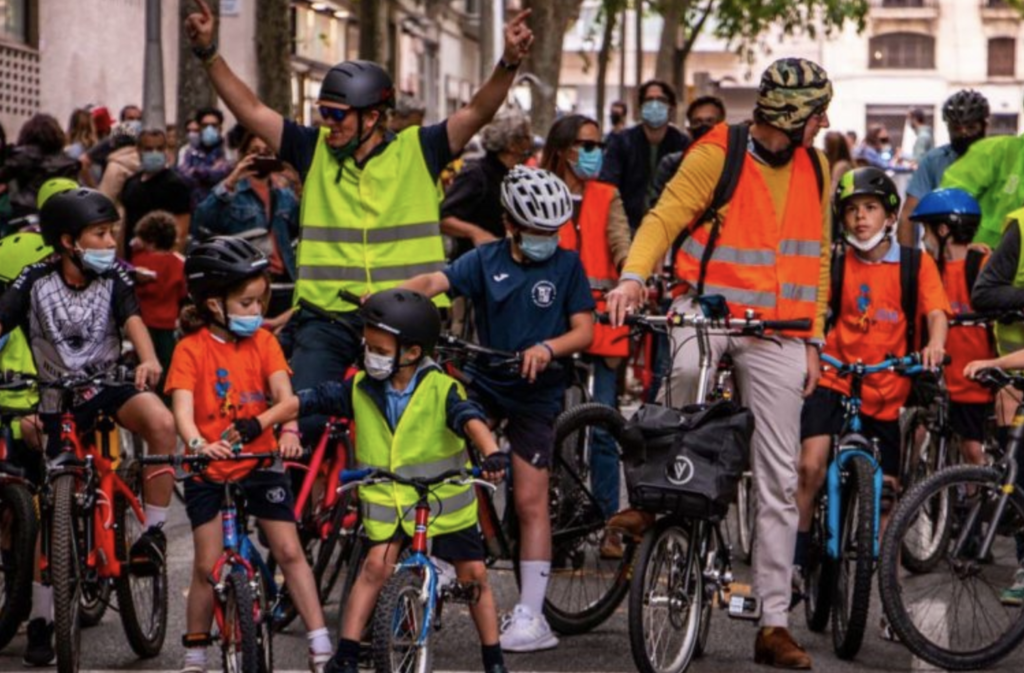
In Barcelona, Kids Bike to School in Large, Choreographed Herds: Here they come: A tightly packed, brightly dressed cluster of pedaling kids –– this is the scene every school-day morning in Barcelona. Spain’s model for letting children commute independently is as coordinated as any good transit system. It may look rambunctious, but the breathtaking ‘bicibús’ is a finely tuned system that lets children travel safely. Read more>>
Car-Free Streets Are Here To Stay: During the Covid-19 pandemic, cities around the world closed down streets to cars and opened them up for people. Over two years later, some of these experiments were so popular that they are here to stay. Here are four car-free streets that are still going strong or just getting started. Read more>>
Bike Libraries Are Boosting Access To Bikes Across The US: At Madison, Wisconsin’s nine public libraries, residents can check out books of all kinds, from hardbacks and paperbacks to ebooks and audiobooks. They can check out movies as DVDs and Blu-rays. And since last year, library card holders can also check out electric bicycles. Madison’s public libraries are part of a growing number of bike libraries in cities and towns from coast to coast. A list of U.S. bike lending libraries curated by StreetsblogMASS reporter Grecia White documents 35 such programs, from Vermont to Texas. Read more>>
Plants By School Playgrounds Protect Kids From Road Pollution, Study Finds: A new study finds that planting vegetation between school playgrounds and roads can go a long way to protecting students from traffic-related air pollution. Editor’s Note: I love how this story shows a different kind of nonviolence, one anchored in preventing harm by working with nature. Read more>>
Green Schools Start With Greener Lunches: NYC Public Schools Are Plant-Based Leaders: Plant-based advocates refer to meat reduction efforts as a sort of “Green New Meal”—an opportunity to teach students about the impacts of our current factory farm-dominated food system on our health, animals, and the environment. Read more>>
Teen Court Delivers Justice – Restorative Justice: The Teen Court program at Reach For Youth in Indianapolis is a nationally-recognized program that brings youth offenders in front of a jury of their peers who decide which restorative consequences would be best fit to restore the harm that has been caused. Read more>>

Tapping Into Insect Farming To Clear Zimbabwe’s Urban Waste: Farmers are turning to vermiculture farming to deal with Harare’s uncollected garbage problem and to produce affordable livestock feed. Read more>>
San Francisco Bay Is Becoming a Safe Haven For Whales: So far this year, four whales have been killed by ships near San Francisco, and climate change is forcing new feeding habits that increase the risk of collision. Now, officials are hopeful that such collisions could decline dramatically. A week ago, a high-tech detection system called Whale Safe was switched on in the city’s bay. Powered by buoys outfitted with underwater microphones that send data to satellites, the system alerts ships to whales in the area, allowing them to slow down or alter course. Whale Safe has already been proven to work in the Santa Barbara Channel, where no incidents of ships striking whales have occurred since it began operating over a year ago. Read more>>
Your Lawn Could Be a Wild Sanctuary: Lawns are the US’ biggest irrigated crop. Transforming them into natural habitats could do wonders for Earth’s biodiversity. Nouveaux Voisins — New Neighbors, in English — envisions a world of yards like this, where suburban landscapes teem with life and buzz with planet-nourishing biodiversity. The Montreal-based nonprofit aims to “transform the culture of lawns” by educating people about how they can turn their yards (or balconies, or window ledges) into critical habitats for native plants and pollinators. Read more>>
Guaranteed Income Pilot Programs Have Changed Young People’s Lives: Some guaranteed income pilot programs are backed by mayors and designed to extend support across a specific city or county. Many are backed by nonprofits, funded through private donations, and targeted towards specific demographic groups like new mothers, single fathers, or formerly incarcerated people. Others are some combination of all of the above. Teen Vogue spoke to a few young participants of guaranteed income pilot programs around the country about their experience receiving consistent no-strings-attached cash payments. Read more>>
How a Brazilian Town Took A Bet On Basic Income: The seaside town of Maricá, Brazil, was struggling, but it had oil revenue. So the local government started a basic income program based on a local alternative currency. Read more>>
Market Box Delivers Food—And Solidarity—To The People: Created at the height the pandemic, Chicago’s Market Box began as a direct response to help families pushed into food insecurity access fresh meals. To date, the volunteer-led operation has distributed over 10,000 boxes to families in need, sourcing all of their produce from local small-to-medium sized farms. Learn more about their work and how you can support their mission here. Read more>>
Soda Taxes Improve Equity: To date, eight cities in the U.S. have instituted a sugary beverage tax. In Philadelphia, the tax revenue has gone toward expanding universal pre-K and growing a community schools program. In our lead story, Cinnamon Janzer looks at new research that points to the soda tax’s effectiveness at redirecting funds to lower-income communities, in Philly and Seattle specifically. Read more>>
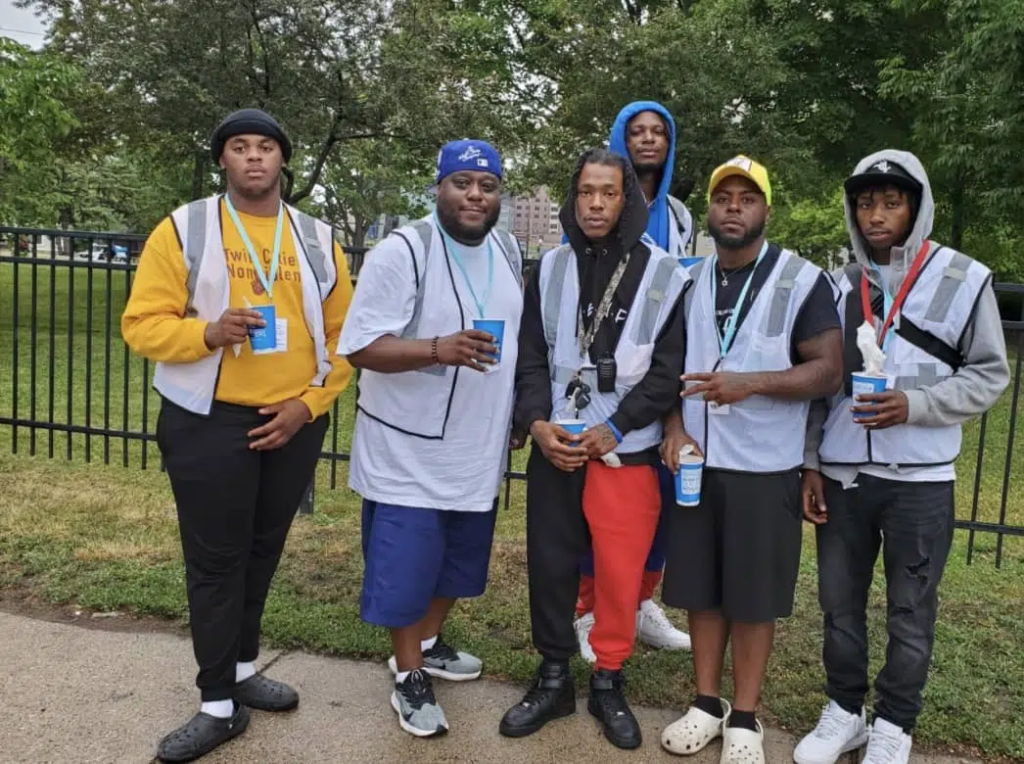
Introducing Community Peacebuilders In Minneapolis: At the start of February, Nonviolent Peaceforce welcomed four Community Peace Builders, as well as their mentor Will Wallace, to their Minneapolis-St. Paul team. Peacebuilding is most effective and most likely to succeed when local voices, particularly those most targeted by violence, are at the helm. Now, the Community Peace Builders continue that ethos and legacy as they work to address community conflict and violence in North Minneapolis. The focus of their work will be on addressing gun violence and community violence, as well as adapting unarmed civilian protection training to resonate with the needs and strengths of Northside residents. Read more>>
In Baltimore, Healing Trauma Is Now the Official Policy: A groundbreaking law directs city agencies and employees — from cops to librarians — to root out practices that cause trauma. Already, lives have been saved. Read more>>
A Trauma-Informed Healing Approach to Urban Gun Violence: A public health-informed approach acknowledging racial trauma and emphasizing individual healing is a promising way to address urban gun violence. Deploying formerly incarcerated community members as street outreach mentors to interrupt violence and target influential individuals most involved in gun violence is key to violence reduction. Read more>>
Grand Rapids Reduces Gun Violence By 8%: In Grand Rapids, MI, the Cure Violence partner site shared its annual report highlighting successes from the program in its first eight months of implementation, including an 8% reduction in gun violence. Read more>>
Mapping The Police – Citizen Control Of the Security Forces In Buenos Aires: Last week, Ofelia Fernández, a member of the Buenos Aires legislature, announced on her social media the launch of a Map of the City’s Police, a collaborative webpage whose objective is to highlight, identify, and denounce situations of police violence within the territory of Buenos Aires; consequently allowing citizens to hold local security forces to account. This tool of citizen participation was designed in conjunction with a network of individuals and organizations. If an officer is implicated in a case of police violence or a shooting, that information is easily accessible. Read more>>
DC Violence Interrupters See Decrease In Homicides: In Washington, DC, six target areas implementing the Cure Violence model saw a 47% decrease in gun homicides and a 3% decrease in assaults with a deadly weapon from 2020-2021. Read more>>
How A Faith Community In Indiana Reinvented Public Safety: With a decade of organizing, Faith in Indiana turned that red state’s largest city towards a more preventive approach to crime. Black clergy and churchgoers won the adoption of a violence-prevention program and reforms to police governance. Read more>>
This Mexican Town Kicked Out The Government 10 Years Ago … And Is Thriving: The autonomous town of Cheran in Michoacan is in a state which has long been a hotspot in Mexico’s bloody drug war. After years of being terrorized by narco-traffickers who operated with conjunction with the state government, the inhabitants of Cheran abolished the police, and expelled both the government and other organized crime from their municipality. Read more>>

Latin America’s Ecobarrios: Ecobarrios (ecological neighborhoods), eco-villages and other styles of “buen vivir” (literally “good living,” an Andean concept that incorporates a more ecological and equitable standard of living) stand out for their resilient and regenerative impetus for society. Read more>>
Spaces of Opportunity Is Sowing The Seeds Of Community And Change: In southern Phoenix, a plush urban farmstead serves as a vital resource for a community housed in the middle of a food desert. Since the start of the pandemic, they’ve distributed over 70,000 pounds of food per year to families in need. Read more>>
How Equitable Strategies In Harm Reduction Are Keeping Communities Safe: From legal action networks to businesses that employ returning citizens, there is a growing network of initiatives committed to combatting the negative legal, social and economic impacts of drug use, specifically in vulnerable communities. They’re working at the intersection of socioeconomic justice, racial equity, and addiction support. Read more>>
Italian Co-ops Hire Inmates (And Pay Fair Wages) To Make Food & Fashion: Proudly ‘Made In Prison.’ Prisoners in Italy have to pay for their own detention, and often leave prison in debt and without skills. A network of co-ops is trying to change this by hiring prisoners (for the same wages as people make on the outside) to be artisanal producers of everything from food to clothing and accessories. Read more>>
Why The Dutch Are Closing Prisons – And What They’re Doing With Empty Ones: The Netherlands has reduced its prison population to such a degree that it’s now turning old prisons into socially useful buildings, such as schools and refugee centers. Here’s what went right. Read more>>

How the Swinomish Are Reviving a Native Oyster and Protecting Eelgrass in Puget Sound: An Indigenous-owned aquaculture company is showing how to balance ecosystems and economic growth. Read more>>
England’s Farmers Will Be Paid To Rewild Land: Farmers in England will be given taxpayers’ cash to rewild their land, under plans for large-scale nature recovery projects announced by the government. These will lead to vast tracts of land being newly managed to conserve species, provide habitats for wildlife and restore health to rivers and streams. Read more>>
Dads Flock to Hair-Braiding Class: When Annis Waugh offered a hair-braiding class just for dads for a school fundraiser, it rapidly filled up with dads eager to learn how to care for their daughters’ hair. As one eager dad observed: “It shouldn’t just be one gender doing stuff like this. The more we do and share the load, the better is it for my daughters.” Read more>>
In Boston, There’s An Approach to Housing That Avoids Eviction: A major for-profit affordable housing provider hasn’t evicted a single tenant since early 2020. How did the company do it, and can its method be a model for other developers? Read more>>
New Housing Development Takes A Different Approach To End Homelessness: A new housing development trying to tackle homelessness is taking a new approach to the problem. While other housing options require residents to be clean of any drug or alcohol use, the new development, Hope Village, believes housing first is the solution to ending homelessness altogether. Read more>>
Four-Day Working Week Pilot Launches in UK With 100-80-100 Model: A four-day working week six-month pilot program has been launched in the UK. Participating companies and organizations will trial a four-day week with no loss in pay for employees based on the principle of the 100:80:100 model. This entails 100 per cent of the pay for 80 per cent of the time, in exchange for a commitment to maintain at least 100 per cent productivity. Read more>>
